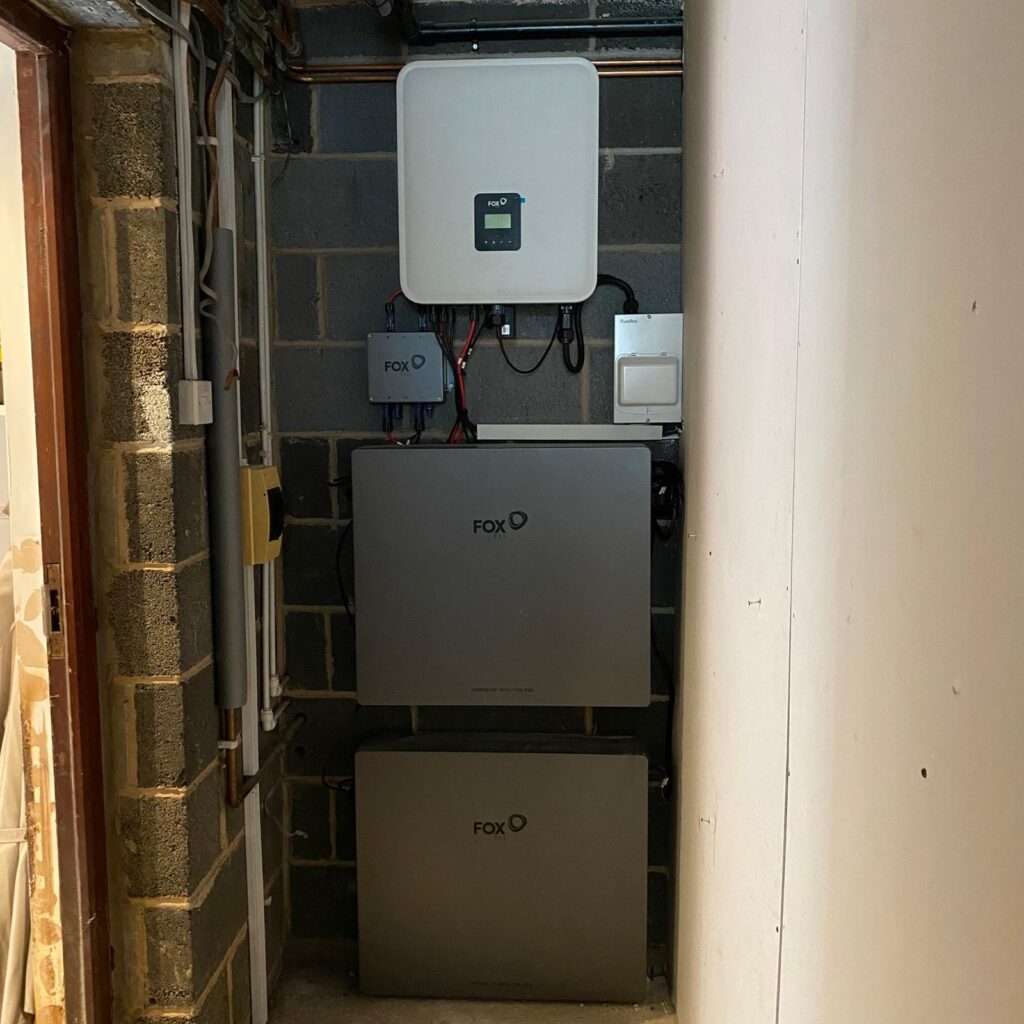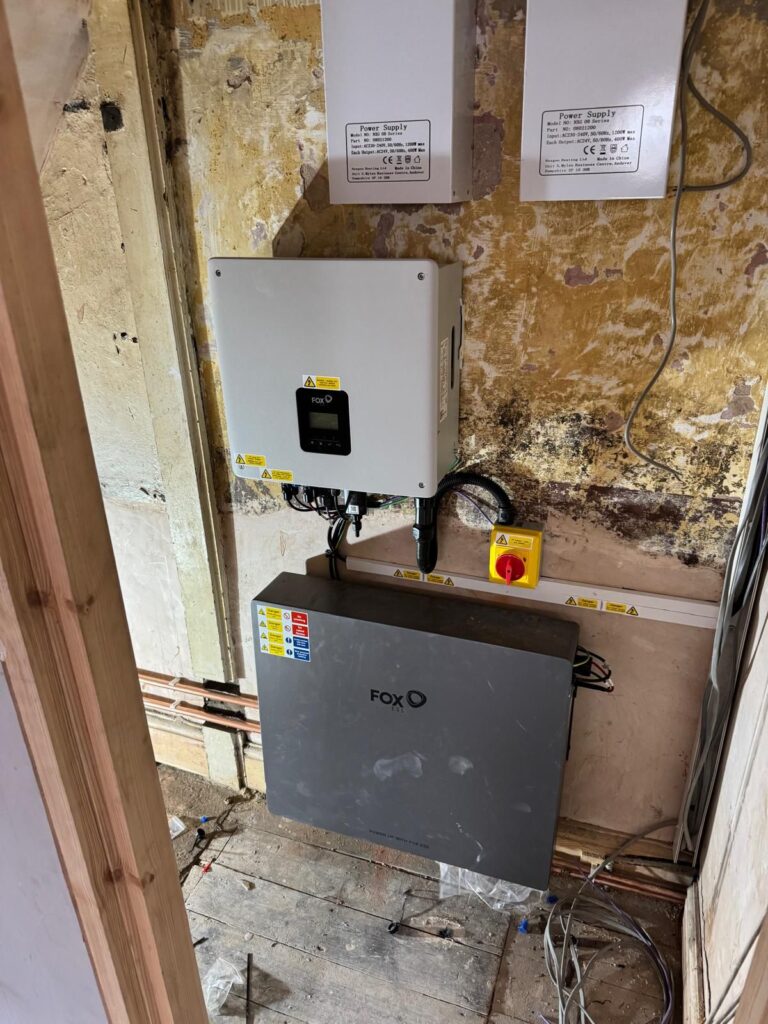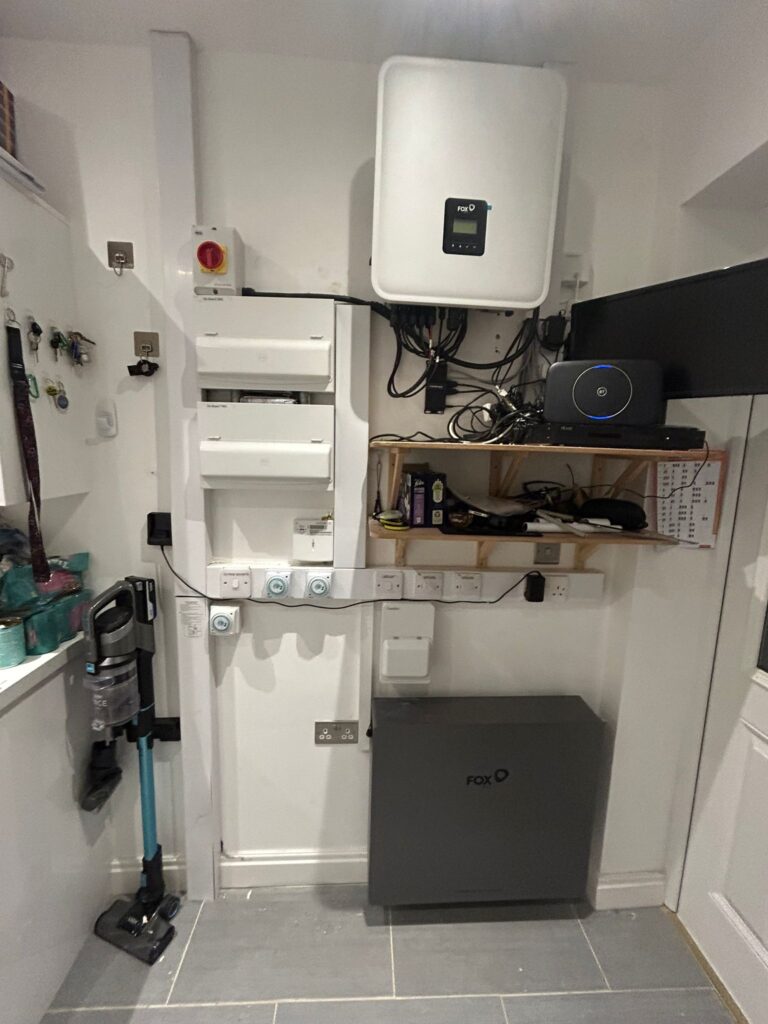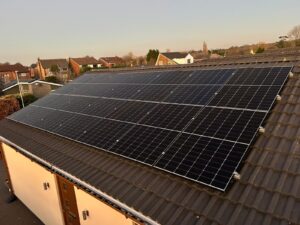Adding a battery to your solar system helps you keep more of the free energy you make. Solar panels create electricity when the sun shines. Without a battery, spare power goes back to the grid. A battery stores that extra energy so you can use it at night, on cloudy days or when energy prices rise.
Flux Solar Energy is based in Westhoughton near Bolton. We help homeowners across Manchester, Preston and the wider North West design optimised solar and battery setups. This guide explains how batteries work. It shows why adding or retrofitting one makes sense and what to think about before you invest.
Why consider a battery?
Batteries are more affordable today. Until 2027, domestic battery installations are zero‑rated for VAT. Adding storage with your solar panels, or later, can save you money because you need less electricity from the grid. The Energy Saving Trust says battery storage systems let you use more renewable electricity and rely less on fossil fuels. They allow you to:
- Make the most of clean energy – excess solar power produced during the day is stored instead of being wasted or exported.
- Use energy when it suits you – run appliances in the evening using stored electricity, instead of paying peak rates.
- Reduce carbon emissions – using renewable energy for longer periods lowers your home’s footprint.
- Benefit from time‑of‑use tariffs – charge the battery with cheap overnight electricity and use it during expensive periods.
Transitioning to battery storage also future‑proofs your home. If you plan to install an EV charger or heat pump later, a battery can help power these high‑demand devices. That way, you don’t need to oversize your solar panels.
How does a solar battery work?

Solar batteries store the direct current (DC) electricity your panels make during the day. An inverter turns the stored energy into alternating current (AC) for your household appliances. When your panels make more than you need, the battery charges. When you need more than the panels supply, the battery discharges. For retrofits, you usually add an AC‑coupled battery that connects to your existing inverter. For new systems, a DC‑coupled battery can be built in for better efficiency.
Energy flows from the panels first, then from the battery, and finally from the grid. You can sell surplus energy back to the grid under the Smart Export Guarantee, but using your own stored energy is usually cheaper.
Can I retrofit a battery?
Yes. You don’t need to install a battery when you first fit solar panels. MCS Certified advises that a battery can be added to existing solar arrays by a qualified installer. The battery will be wired into your system and set to charge and discharge automatically. Many homeowners add storage a few years after installing panels, once they see the benefits and want to save more.
When retrofitting, you normally use an AC‑coupled battery that works with your existing inverter. The inverter sends extra energy to the battery and draws it back when needed. Flux Solar Energy can assess your system, check compatibility and design a seamless battery upgrade.
Benefits of adding a battery
Adding a battery to your solar system provides several tangible benefits. In simple terms, you keep more of what you generate and spend less on electricity. Here’s a closer look:
Increased self‑consumption
Without storage, you might use only half of the energy your panels produce. With a batter,y you can use almost all of it. Solar Energy UK says homes with solar and storage can save £1,151–£1,428 a year.
Lower bills and protection from price spikes
Electricity prices change throughout the day. Peak rates can be twice as high as off‑peak rates. A battery lets you avoid those spikes by using stored solar energy. You can also charge the battery at night on a cheap tariff and use that power during the day. This flexibility cushions you from price swings and helps you budget more accurately.
Reduced carbon footprint
By extending the hours you run your home on renewable energy, you reduce demand for grid electricity generated from fossil fuels. The Energy Saving Trust notes that storing renewable electricity lowers carbon dioxide emissions.
Backup power and resilience
Some battery systems provide backup power during outages. Although not all home batteries offer full backup capability, larger units can keep essential circuits running. This is valuable in rural areas or for households requiring an uninterrupted supply.
Future‑proofing for EVs and heat pumps
Electric vehicles and heat pumps draw substantial power. Adding storage now means your solar system will be ready to support these technologies. It also allows you to take advantage of EV tariffs by charging the battery and your vehicle during off‑peak hours.
Costs and considerations
Batteries are a significant investment, so it’s important to weigh the costs against the benefits. Key points to consider include:
- Upfront cost: Energy Saving Trust estimates that a 5 kWh battery system costs around £4,600. Prices range from £1,500 to £10,000 depending on size and technology. Money Saving Expert suggests the average battery costs around £5,000.
- VAT relief: Standalone batteries installed between February 2024 and March 2027 are zero‑rated for VAT, making them more affordable.
- Lifespan: Most home batteries last 10–12 years, so you may need to replace the unit once during your solar panels’ 25‑year lifespan. Money Saving Expert notes that batteries typically last 5–15 years.
- Efficiency losses: Using stored energy is slightly less efficient than direct solar consumption, as some energy is lost during charging and discharging.
- Space requirements: A typical battery measures about 100 cm × 60 cm × 25 cm and is usually installed indoors in a garage, utility room or loft. Ensure there is adequate ventilation and space for future expansion.
- Sizing and compatibility: Choose a battery size that matches your electricity use and generation. MCS advises considering how much energy you want to store and how much power you need at once. Compatibility with your existing solar inverter also matters – our experts will advise on AC or DC‑coupled solutions.
What size battery do I need?

There is no one‑size‑fits‑all answer, but typical domestic batteries range between 1 kWh and 16 kWh. For homes heated by gas or oil, a 5 kWh battery is common, while properties with electric heating or heat pumps often benefit from a 9 kWh unit. When sizing your battery, think about:
- Daily electricity usage: the amount of kilowatt-hours (kWh) you use each day. A battery should cover your evening and overnight needs.
- Solar generation refers to the capacity of your solar array and the amount of surplus energy it produces. Panels generate more in summer and less in winter.
- Future plans: whether you intend to add an EV, heat pump or additional appliances. It may be worth oversizing slightly to accommodate future demand.
- Tariff strategy: if you’re on a time‑of‑use tariff, you might choose a larger battery to maximise cheap overnight charging.
Flux Solar Energy designs each system individually, ensuring your battery is neither too small nor too large. Our design team considers your usage patterns, roof orientation and budget to deliver the best return on investment.
Designing an optimised system
Optimising a solar‑plus‑battery system involves more than simply adding a storage unit. At Flux we take a holistic approach:
- Comprehensive energy assessment: We look at your past electricity bills, roof and daily routine. This helps us see when you use energy and how much surplus you generate.
- Battery selection: We recommend the right battery type, size and power for you. We check it works with your inverter or advise on an upgrade.
- Integration with smart tariffs: We set your system to charge when electricity is cheap and discharge when it’s expensive. We can also integrate EV or heat pump controls.
- Safety and certification: We follow MCS and HIES standards so your system is safe and qualifies for schemes like the Smart Export Guarantee. We explain warranties and maintenance.
- Local expertise: Being based in Westhoughton, we understand the unique weather patterns and roof styles across Greater Manchester, Lancashire and Cheshire. We customise tilt angles and mounting systems to maximise generation in our region.
Getting started
If you’re ready to add a battery to your solar system, here’s how to proceed:
- Review your current solar performance: Look at how much surplus solar energy you export and when you use electricity at night. This helps pick the right battery.
- Book a consultation: Contact Flux Solar Energy for a free assessment. We’ll inspect your system, discuss your goals and provide a tailored proposal.
- Consider funding and incentives: With 0% VAT until 2027 and payments for exported electricity, now is a great time to invest. Some regions offer extra grants; ask us for details.
- Schedule installation: Once you’re happy with the design, we’ll install the battery at your convenience. We’ll test the system, explain how to monitor it and leave you with a comprehensive handover pack.
- Enjoy your savings: Start using stored solar energy whenever you need it. Over time, you’ll see your electricity bills drop and your home’s carbon footprint shrink.
Useful resources
To explore battery storage further, check out these independent guides:
- Learn more about storing energy in the Energy Saving Trust’s guide about battery storage.
- Read the UK government’s guide to the Smart Export Guarantee to understand how export payments work.
- Find out why certification matters at MCS Certified.
- For consumer advice on costs and whether a battery makes sense for you, see MoneySavingExpert’s solar battery guide.
Conclusion
Adding a battery turns your solar system into a mini power plant. You gain more control, cut your bills, lower your carbon footprint and prepare for electric cars and heat pumps. With 0% VAT and falling prices, now is the perfect time to invest.
Flux Solar Energy helps homeowners across the country design and install battery systems. We guide you through every step, from choosing the right battery to integrating smart tariffs and keeping your system safe and efficient.

Ready to capture more free energy and cut your bills? Contact us today to begin your journey.





